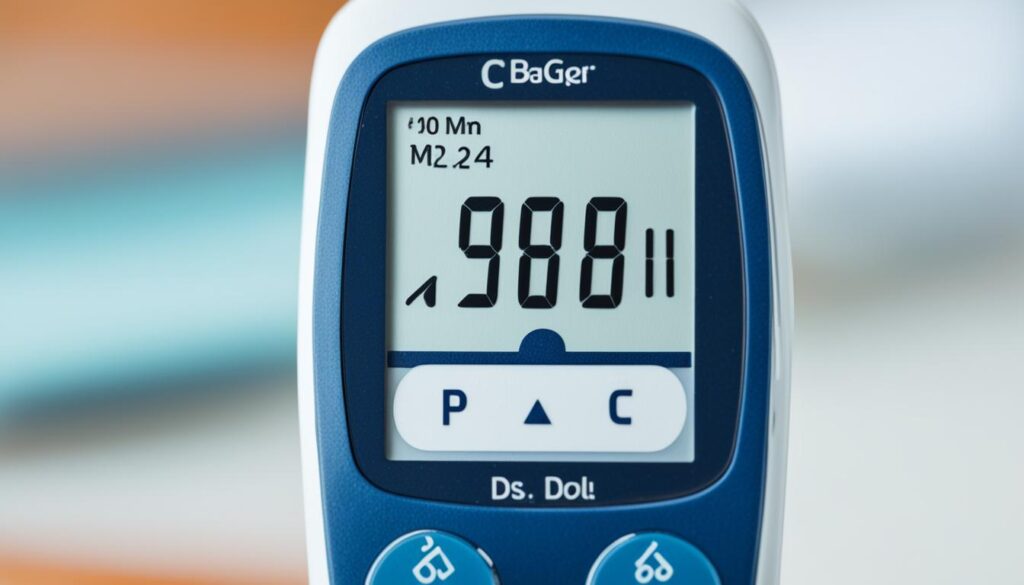Keeping your blood sugar levels healthy is key for feeling good. This guide will help you understand blood glucose, track your levels, and manage them well. We’ll look at how diet, exercise, and medicines can help you stay healthy.
By the end, you’ll know how to handle your diabetes management and improve your type 2 diabetes. This will lead to better blood glucose control.
Key Takeaways :Blood Sugar Levels For Optimal Health
- Maintaining healthy blood sugar levels is essential for overall well-being.
- Understanding the relationship between glucose and insulin is crucial for managing blood sugar levels.
- Regularly tracking your blood sugar levels can help identify patterns and guide your management approach.
- Adopting a healthy diet, staying active, and maintaining a healthy weight can significantly impact blood sugar control.
- Properly using medications, such as insulin, and monitoring for side effects and interactions is important for effective diabetes management.
Understanding Blood Glucose
Keeping healthy means knowing about blood glucose and its importance. Glucose is the main energy source we get from food, especially carbs and sugars. It moves through the blood to feed our cells with the help of insulin.
Glucose and Insulin
Insulin, made by the pancreas, is key in glucose metabolism. It helps cells take in and use glucose for energy. But when the body gets insulin resistance, a common issue in type 2 diabetes, cells don’t respond well to insulin. This leads to more glucose in the blood and hyperglycemia.
Type 2 Diabetes and High Blood Sugar
In type 2 diabetes, the body can’t use insulin well, causing high blood sugar. This often comes from a lack of exercise, eating poorly, and being overweight. Knowing what causes type 2 diabetes helps us find ways to keep blood glucose levels healthy.
Tracking Blood Sugar Levels

Keeping your blood sugar levels healthy is key to managing diabetes and avoiding health problems. By checking your blood sugar often, you can see how your body reacts to food, exercise, and medicine. This helps you make better choices for your health.
Fasting Blood Glucose Levels
The fasting blood glucose test is a common way to check your blood sugar. You don’t eat or drink anything (except water) for at least 8 hours before the test. This test shows how well your body controls blood sugar.
- Normal fasting blood glucose levels are below 100 mg/dL (5.6 mmol/L).
- Prediabetes is indicated by fasting blood glucose levels between 100-125 mg/dL (5.6-6.9 mmol/L).
- Diabetes is diagnosed when fasting blood glucose levels are 126 mg/dL (7.0 mmol/L) or higher.
Checking your fasting blood glucose often can spot problems early. This lets you take steps to keep your health in check.
| Blood Glucose Level | Interpretation |
|---|---|
| Less than 100 mg/dL (5.6 mmol/L) | Normal |
| 100-125 mg/dL (5.6-6.9 mmol/L) | Prediabetes |
| 126 mg/dL (7.0 mmol/L) or higher | Diabetes |
By keeping an eye on your blood sugar, you can understand how different things affect you. This helps you make choices to stay healthy. Talk to your doctor to find the best way to check your blood sugar.
Tips for Successful Blood Sugar Management

Keeping blood sugar levels healthy is key for feeling good. Using a mix of strategies can help manage blood sugar and boost life quality. Let’s look at some important tips for managing blood sugar well.
Eat a Healthy Diet
Eating a balanced diet full of nutrient-rich foods is key for controlling blood sugar. Include lots of vegetables, fruits, whole grains, and lean proteins in your meals. Cut down on added sugars, refined carbs, and processed foods, as they can cause blood sugar to go up.
Stay Active
Being active is crucial for managing blood sugar. Doing aerobic exercises like walking, swimming, or cycling can lower blood sugar and make insulin work better. Adding strength training can also help control glucose levels.
Maintain a Healthy Weight
Having a healthy weight is important for managing blood sugar. Too much weight, especially around the belly, can make insulin resistance and type 2 diabetes more likely. Eating well and exercising regularly can help you stay at a healthy weight.
Avoid Nicotine
Smoking and nicotine products can harm blood sugar control. Nicotine messes with insulin and makes insulin resistance worse. Quitting smoking or avoiding nicotine can improve blood sugar and health.
By following these tips, people can take steps to manage their blood sugar better and feel better overall.
The Impact of Food on Blood Sugar Levels

The foods we eat, especially carbohydrates, greatly affect our blood sugar levels. Learning how to manage carbs and use the plate method for meals is key. It helps keep glucose levels healthy, especially for those with diabetes or prediabetes.
Meal Planning and Carbohydrate Counting
Good meal planning means paying attention to carbs. By counting carbs and adding them to meals wisely, we can control our blood sugar. It’s about knowing the carbs in foods and adjusting how much we eat.
The Plate Method for Balanced Meals
The plate method makes it easy to create meals that help keep blood sugar levels healthy. It’s about dividing your plate into parts and filling it with nutrient-rich foods. This method helps manage carbs and plan meals well.
Using these strategies, we can control how food affects our blood sugar. The plate method is a great way to make meals that are good for our blood sugar and overall health.
Exercise and Blood Sugar Management

Regular exercise is key for managing blood sugar levels in people with diabetes. Activities like moderate aerobic exercises and strength training can lower blood glucose and make insulin work better. It’s important to work with health experts to create a safe exercise plan.
Developing an Exercise Plan
Creating a detailed exercise plan helps manage blood sugar. When planning with your health team, think about these things:
- Type of exercise: Mix aerobic activities like walking, swimming, or cycling with resistance training like weightlifting or bodyweight exercises.
- Frequency and duration: Aim for 150 minutes of moderate exercise each week, spread across several days.
- Timing: Plan workouts around your meals and meds to control blood sugar better.
- Gradual progression: Start with low intensity and slowly increase as you get fitter to avoid low blood sugar.
Precautions for Exercise with Diabetes
When exercising with diabetes, remember these important steps:
- Check your blood sugar before, during, and after exercise to keep it safe.
- Always carry fast-acting carbs like glucose tablets or juice for low blood sugar.
- Wear good shoes and check your feet for injuries or irritation, as diabetes can make foot problems more likely.
- Drink plenty of water and adjust your insulin as needed to avoid blood sugar issues.
- Talk to your health team about exercises or activities that might not be safe for you.
With a good exercise plan and safety steps, people with diabetes can manage their blood sugar and boost their health.
Medications and Blood Sugar Levels

Managing blood sugar levels is not just about diet and exercise. Medications like insulin are key for many people. It’s important to store and use these medications right and watch for side effects and interactions.
Proper Storage and Use of Insulin
Insulin helps the body use glucose better. Keeping insulin right is key for its safety and effectiveness. It should be kept cold, away from heat and light, and used before it expires. Learning the right way to inject insulin can also prevent problems.
Monitoring for Side Effects and Interactions
Medicines for blood sugar management, like insulin, can have side effects or interact with other drugs. Watching for signs like low blood sugar is important. If you notice any issues, talk to your doctor. Regular check-ups and blood tests can spot problems early.
| Medication | Potential Side Effects | Possible Interactions |
|---|---|---|
| Metformin | Nausea, diarrhea, lactic acidosis | Alcohol, ACE inhibitors, certain antibiotics |
| Insulin | Hypoglycemia, weight gain | Corticosteroids, thyroid medications, some diuretics |
| Sulfonylureas | Hypoglycemia, weight gain | NSAIDs, certain antibiotics, some antidepressants |
Knowing how to store and use insulin and watching for medication side effects and drug interactions helps manage blood sugar levels. This keeps you healthy.
Blood Sugar Levels For Optimal Health

Keeping optimal blood sugar levels is key for good health and lowering diabetes risks. The healthy blood glucose range depends on you, but usually, it should be between 70-99 mg/dL before meals. After eating, it should not go over 180 mg/dL.
Checking your blood sugar levels often helps keep them in check. You can use a glucose meter, go for lab tests, or wear a continuous monitor. Knowing what your levels should be helps you make choices to stay healthy.
| Blood Glucose Levels | Optimal Range | Prediabetes Range | Diabetes Range |
|---|---|---|---|
| Fasting | 70-99 mg/dL | 100-125 mg/dL | 126 mg/dL or higher |
| Post-Meal (2 hours after eating) | Less than 180 mg/dL | 140-199 mg/dL | 200 mg/dL or higher |
Work with your healthcare team to find the right optimal blood sugar levels for you. Staying in the healthy blood glucose range helps prevent or manage diabetes. This leads to better health overall.
“Achieving and maintaining healthy blood sugar levels is a journey, not a destination. With the right strategies and support, you can take control of your diabetes management and thrive.”
Also Read : Best Tips For Maintaining A Healthy Lifestyle
Conclusion
Managing blood sugar is key to staying healthy and feeling good. By learning about glucose and insulin, people can keep an eye on their blood sugar. They can also use a mix of healthy eating, regular exercise, and maybe medication if needed.
This article has shared tips and methods to help manage blood sugar better. It covers meal planning, counting carbs, and exercising right. These steps help people take charge of their health and lower the risk of problems from high blood sugar.
Putting blood sugar management first leads to better health overall. By using the advice in this article, readers can start on a path to better health and a better life. They can improve their health and enjoy life more.
FAQs
Q. What is the importance of maintaining healthy blood sugar levels?
Keeping blood sugar levels healthy is key for good health. It gives the body the energy it needs and lowers the risk of diabetes problems. It also supports overall health.
Q. How can I track my blood sugar levels?
It’s important to check your blood sugar regularly to manage diabetes and stay healthy. Doctors can give you blood glucose readings and advice. Normal levels are below 100 mg/dL. Levels between 100-125 mg/dL mean you might have prediabetes. Diabetes is diagnosed at 126 mg/dL or higher.
Q. What are the key strategies for managing blood sugar levels?
Managing blood sugar well means eating right, staying active, keeping a healthy weight, and avoiding nicotine. Taking the right diabetes medications is also key. This helps keep your blood sugar in check.
Q. How do the foods I eat affect my blood sugar levels?
The carbs in what we eat greatly affect our blood sugar. Learning about carb counting and using the plate method for meals helps manage glucose levels. This is especially helpful for people with diabetes or prediabetes.
Q. What are the benefits of exercise for blood sugar management?
Exercise, like aerobic and strength training, lowers blood sugar and makes insulin work better. It’s important to plan your exercise with a doctor. Always check your blood sugar before, during, and after working out.
Q. How can medications help regulate blood sugar levels?
Medicines like insulin are vital for controlling blood sugar, especially if diet and exercise aren’t enough. It’s important to store and use insulin correctly. Watch for side effects and interactions with other drugs.
Q. What are the recommended blood sugar levels for optimal health?
Keeping blood sugar in the right range is key for good health and avoiding diabetes problems. Doctors set targets based on your health. Regular checks help keep your glucose levels healthy.








Leave A Comment